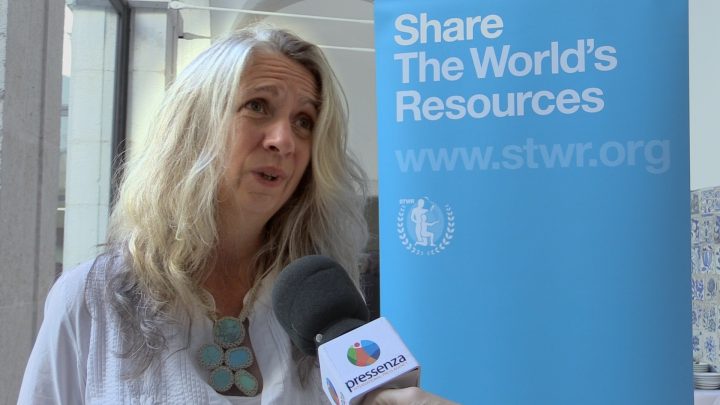A member of Share the World’s Resources, she believes there is only one humanity and we must work together for the good of all.
Sonja Scherndl works at Share the World’s Resources in London. She first heard about Basic Income about a year ago at a conference where she met a Basic Income advocate. At the time, Sonja was working on Article 25 and together they thought it would be perfect if the two things could come together because it would be a stronger case for both of them. This article of the United Nations Universal Declaration of Human Rights states that everyone has the right to a decent and adequate housing.
Vídeo: Álvaro Orús and Mayte Quintanilla
According to Sonja, Basic Income and Article 25 have one very strong thing in common: they talk about all people, no one is excluded. Basic Income is the monetary side of things and Article 25 is the basic needs that we all have around the world. “It would actually force governments to work together for the first time for the good of all,” Sonja said of the union of Basic Income and Article 25.
Where the money will be found is a big question in both movements: “There is a lot of money in the world. SWTR produced a report a few years ago on where the money can be found and it is not really that difficult. We spend a lot of money on the military budget, for example. So if governments can work together for the good of all, then surely we can reduce the military budget in the first place,” she said. Based on her experience, Sonja believes that there are many corners where money can be cut and redirected to people rather than invested in something that will continue to harm humanity.
Sonja also stressed that the biggest obstacle in the movement is people’s mentality of getting free money without working for it. That is why it is so important to approach them directly and say where this money will come from.
“The world is in such a sad state right now. There are 40,000 people who die needlessly every day due to lack of food, medicine… There is only one humanity and what happens to our brothers and sisters happens to us too. In the refugee crisis, if a country is in a terrible state, people will want to move to a country that is in a better position. But in the long run, countries may not be able to cooperate with that. So why don’t we help them solve their problems where they are,” Sonja concluded, recalling that global problems need global solutions.










